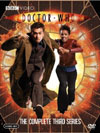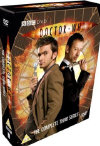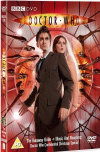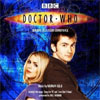DVD Extras (box sets only) include:
After being far too Earth-bound over the past two years, Doctor Who now has a clear chance to break new ground, yet we find ourselves right back on present-day Earth again, bogged down with the predictability of both Christmas and wedding traditions. Particularly when getting a first view of this story from the Season 29 box set, it's no secret that Catherine Tate's guest character is not meant to continue on as the companion for the season, which seriously brings into question the whole point of the adventure and makes it feel like a cartoon that one is forced to sit through before the main feature begins.
The one caveat here seems to be the length of time it takes before showing a proper normal materialization for the TARDIS. As he has been doing since "The End of the World" (story no. 162), director Euros Lyn doesn't seem to care how many obvious opportunities for this he throws away. This time around, the production crew seem much more interested in showing the machine literally flying through the air instead, undoubtedly filling new viewers' heads with the wrong idea. Thankfully there's enough TARDIS movement in this story to get a few normal trick-dissolves with the right sound effects in later on, and a decent materialization is hastily thrown into this mix. Not quite enough to overpower the goofier flight sequences though.
Comedienne?Despite this being the first thing I'd ever seen Catherine Tate do, and the fact that I avoid spoilers for each new season of Doctor Who like the plague, her reputation for being a comedienne had leaked through. Which made me wonder why this story was so unfunny, when it so clearly wanted to score humorous points with the Doctor and Donna's banter. I think most of the attempted humour falls flat here for the same reason it did back in the televised version of 1965's "The Myth Makers" (story no. 20), which I was very strongly reminded of. A load of simple nagging and whining isn't enough on its own to be funny, and is a dangerously unpleasant thing to be injecting into a script anyway. It isn't really made to work here. I much prefer Tom Baker and Mary Tamm in "The Ribos Operation" (story no. 98) any day.To be fair, better levels of charisma do develop between the Doctor and Donna as the adventure progresses. One sequence that works very well is that of Donna's flashback of meeting her future husband Lance - not only is the humour very well done during this section, but Catherine Tate also gets to trade in the less-than-flattering wedding dress that was hastily thrown to her at the end of last season and give us a greater glimpse of what she might normally be like. And by the time she has her last few scenes with Tennant, her character actually seems to have become somewhat likeable. The mystery of how Donna appeared in the TARDIS is answered fairly strongly by the narrative, but many other necessary logical connections between the story's various elements are only barely held together by single lines of dialogue that are easily missed on both first and subsequent viewings. What purpose do robot Santas serve when one thinks past the mundane "trying-to-scare-average-Londoners-with-everyday-objects-turned-nasty" level, and tries to understand what the villain is getting out of it? What purpose is served by exploding remote-controlled Christmas ball grenades at the reception? Why must Donna's magic be carefully prepared over six months, while Lance is done in six minutes? (There's a line of technobabble to cover this last question; don't blink or you'll miss it. Not that it makes any sense anyway.) And why does a lock exist in the first place motivating our villain to find a key? Oh well. This is not a thinking man's story. This is a woman's domestic-traditions-interrupted-by-monster-traditions story. Those of you looking for some half-decent sci-fi have to wait until the second half, where we at least get some secret laboratories, scientific concepts, new territories and culture to explore, and meaningful confrontation between fairly interesting characters. A small outer-space sequence with terrific visuals is one of the highlights of this section of the story, but the Earth really seems over-used for weird concepts in Doctor Who by now. "Underworld" (story no. 96) seems more believable with virtually the same concept by doing it "way out there" with celestial bodies entirely created by the writers. Russell T. Davies stole from a source too obvious to this show's fans, and like most other things, unnecessarily domesticated the idea once more. Arrgghh. Sarah Parish does a very good turn as the Empress, breathing life and even charm into a prosthetic character that isn't necessarily very interesting on the page. Her character's complicated physical design works fairly well, particularly the eyes in combination with her performance. The mouth-only shots are nowhere near as interesting, and could be dropped in favour of limb or claw shots. Parish proves equally entertaining behind-the-scenes in her get-up as well.
The story's conclusion is not particularly brilliant or exciting, but does remain an enjoyable emotional ride and gives the Doctor his due as the main character. A very good coda follows, which seems to go on just a bit too much longer than it should, in the style of "The Unquiet Dead" (story no. 163). Julie Gardner builds up the scene quite a lot on the commentary. I must disagree with her about the last line of the show; I think it's cheesy - too rooted in a past that I never cared to invest in.
International Titles:Deutsch: "Die aufgelöste Braut"Magyar: "A szökevény menyasszony"Français: "Le Mariage de Noël"Русский: "Сбежавшая невеста"Italiano: "La sposa perfetta"This story has become available on DVD. Click on the Amazon symbol for the location nearest you for pricing and availability:
Note: The full season sets
contain commentaries, behind-the-scenes
featurettes, and other extras.
Comments on this article are welcome. You may contact the author from this page:
|










